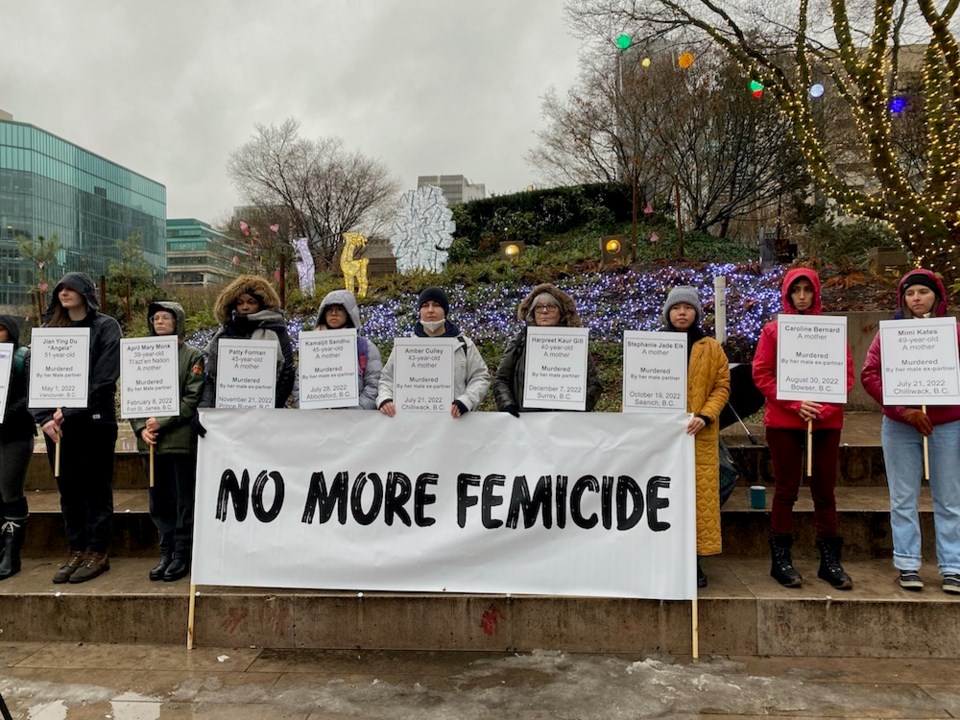The recent killing of 39-year-old Stephanie Forster of Coquitlam is evidence of yet another failure, not to say refusal, by the justice system to meaningfully protect women from male violence even in cases when the danger is not only conceivable but predictable.
Stephanie was afraid of her ex-husband, Gianluigi Derossi, and was granted a protection order from the court. That order didn’t protect her; investigators believe that Derossi, who died from self-inflicted injuries, is responsible for her death.
A woman’s fear has always been a strong indicator of the risk her male partner poses to her as it is grounded in her intimate knowledge of his character, mental state and his limits - or, rather, lack thereof - when it comes to abusing her and punishing her for leaving him. Women know all too well that when the men they have been in a relationship with, threaten to harm and even kill them, these are not empty words. Time and again, men do follow through on their deadly threats. Time and again women’s worst nightmare becomes a terrible, tragic reality.
In February 2022, the BC RCMP issued a news release stating that a 39-year-old woman from Fort St. James was found unresponsive and in medical distress. She passed away the following day. The RCMP also stated that a 39-year-old man, the woman’s partner “was arrested for aggravated assault and breaching release conditions.” The man accused of assaulting his female partner in this case was identified in the media as Donald James Beynon. Court records from Prince Rupert and Vancouver show that he was found guilty for offences marked as “K” in 2011 and in 2017. The BC Prosecution Service identifies and designates every intimate partner violence case approved for prosecution as a “K” file by including a “K” in the registry number of the court. Court records from Fort St James show that he was charged in 2021 for offences marked as “K.” He was then arrested and released with conditions, but now, April Mary Monk of the Tl’azt’en Nation, is dead. The RCMP did not publish her name but we know who she was because her cousin has organized a celebration of April’s life calling for “no more stolen sisters.”
Two months later, in early May, the Vancouver Police Department issued a news release about a female who was found dead at her Olympic Village home. The woman died from fatal stab wounds and a man has been arrested. The VPD’s statement said that investigators believe the suspect and victim knew each other but didn’t specify the nature of their relationship. Later on, the VPD released the name of the victim, Jian Ying “Angela” Du. She was 51 years old at the time of her death. The VPD also released the name of the man, Jian Wei Wang, who is charged with second-degree murder in the killing of Jian Ying. As a news article pointed out, the court classified the case as a “K” file. Our own inquiries at the Vancouver court registry revealed that the accused was arrested last year and charged with assaulting Jian Ying but was released under the condition of having no contact with her. Here again, the woman, Jian Ying Du, is dead.
At the end of July, 43-year-old Amber Culley and 49-year-old Mimi Kates were killed. They were both mothers to young children. Four days later, the B.C. RCMP issued a statement identifying the suspect as Eric John Shestalo. The preliminary findings were that he died from a self-inflicted gunshot wound. While the police statement only said that “the suspect and victims were known to each other,” Amber’s mom, who spoke publicly, confirmed that Shestalo was “Culley’s and Kates abusive ex-partner.” When we searched in Chilliwack Court registry records, we found out that Shestalo was arrested a couple of months before Amber and Mimi were killed and he was charged at the time with two counts of assault and with two counts of uttering threats to cause death or bodily harm. These court files were marked at the registry as “K” files.
Saddened and angry, we wrote to the BC Prosecution Service (BCPS) in Chilliwack. We asked why a dangerous man was “released with no real measures in place to protect his victims and prevent him from following through on his threats.” The unsatisfying response from BCPS concluded with: “The decision whether to oppose or consent to bail, and on what terms, requires Crown Counsel to consider and weigh the competing interests of the accused, the public, and victims. Crown Counsel cannot predict the future actions of the accused with certainty, and thus cannot eliminate all risks.”
We refuse to accept this. When it comes to men’s violence and threat of violence against their female partners during and after the relationship, further violence is, unfortunately, predictable. Otherwise, why grant a protection order or require no-contact as a bail condition to begin with?
Women need real protection, not meaningless bureaucratic mechanisms that leave them defenceless. If the Justice System cannot properly monitor and supervise the whereabouts of men who pose risk to women, then they need to hold them in some form of custody until their trial. Women’s lives must not compete with the interests of the accused; they supersede them.
We have come a long way in terms of our collective understanding of intimate partner male violence and empathy to its victims. More and more women know that they are not responsible for the violence committed against them. More and more women know that the shame and the guilt are not on them but on the perpetrators and more and more women are willing to come forward, report and alert others to the risk they face. It’s about time that they are matched with an appropriate response, one that ensures and secures their safety, one that protects their lives.
Hilla Kerner is a Collective Member of Vancouver Rape Relief and Women’s Shelter



